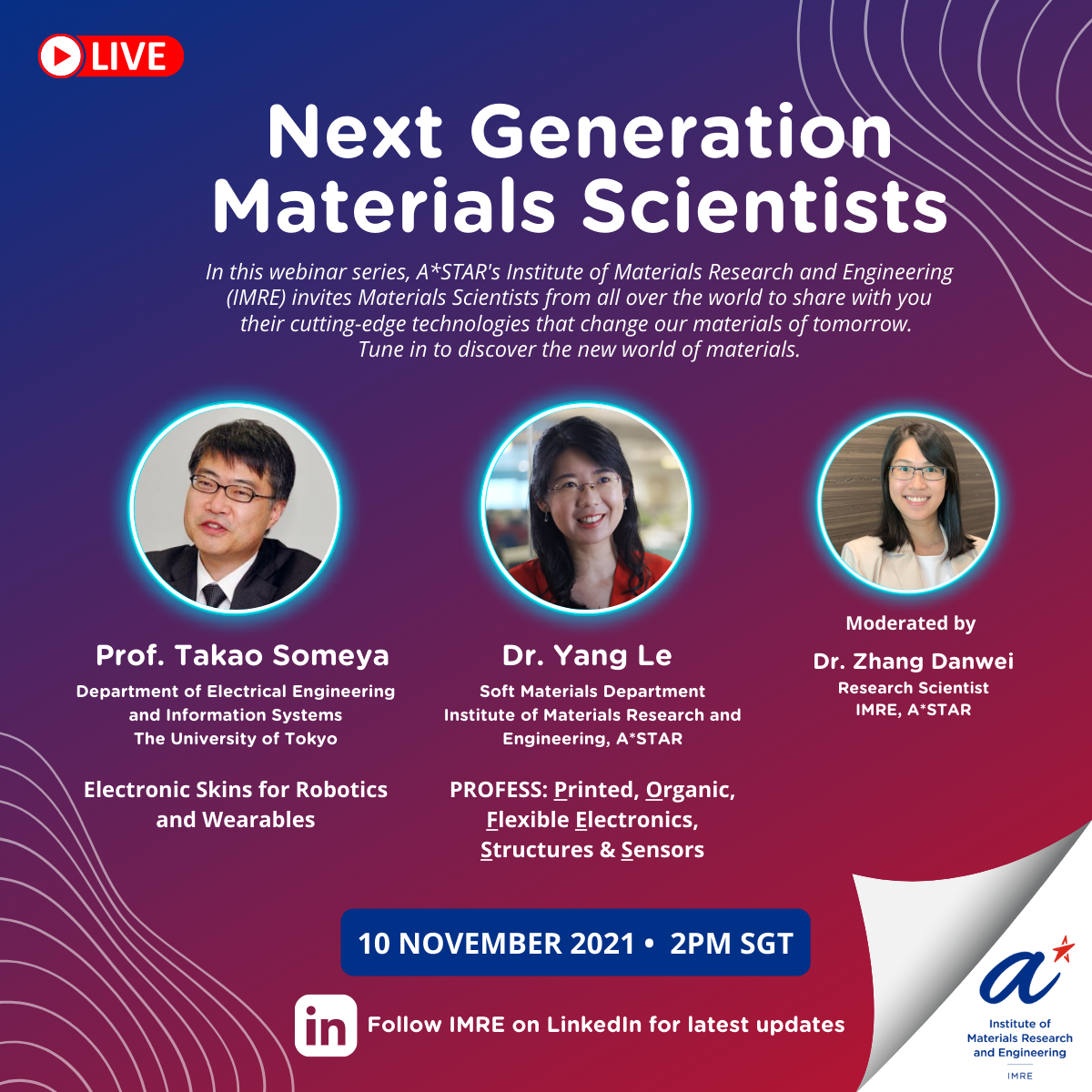Next Generation Materials Scientists
Date
Speakers
10 November 2021
2:00pm to 3:00pm
(SG Time)

Prof. Takao Someya
Prof. Takao Someya
Department of Electrical Engineering and Information Systems, The University of Tokyo
Title: Electronic skins for robotics and wearablesAbstract
The human skin is a large-area, multi-point, multimodal, stretchable sensor, which has inspired the development of an electronic skin for robots to simultaneously detect pressure and thermal distributions. By improving its conformability, the application of electronic skin has expanded from robots to the human body such that an ultrathin semiconductor membrane can be directly laminated onto the skin. Such intimate and conformal integration of electronics with the human skin, namely, smart skin, allows for the continuous monitoring of health conditions. The ultimate goal of the smart skin is to non-invasively measure human activities under natural conditions, which would enable electronic skins and the human skin to interactively reinforce each other. In this talk, I will review recent progress of stretchable thin-film electronics for applications to robotics and wearables and address issues and the future prospect of smart skins.
Biography
Takao Someya is a professor in the Department of Electrical Engineering and Information Systems at the University of Tokyo. He joined the faculty in 1997 after receiving his doctorate in engineering from the University of Tokyo. Following his appointment as research associate and lecturer, he conducted research as visiting scientist at Columbia University’s Nanocenter and concurrently as visiting scholar at Bell Labs, Lucent Technologies. At the University of Tokyo, he became associate professor at the Research Center for Advanced Science and Technology in 2002 and professor at the Graduate School of Engineering in 2009. He is also Team Leader at the Center for Emergent Matter Science in RIKEN since 2015. His area of expertise is soft electronics using organic semiconductors, developing the world's first electronic artificial skin with qualities resembling human epidermis which can measure temperature and pressure distribution. His achievements have been widely recognized, and his “large-area sensor array” electronic thin film was featured in Time Magazine as one of the “Best Inventions of 2005.” The 16th Leo Esaki Prize in 2019 is among the many awards he has received.
Dr. Yang Le
Soft Materials Department, Institute of Materials Research and Engineering, A*STAR
Title: PROFESS - Printed, Organic, Flexible Electronics, Structures & SensorsAbstract
In this talk, we will introduce the work – past, present and future – undertaken by myself and our group in the organic electronics field – in luminescent materials, optoelectronics and wearable sensors. we will start by looking at accomplishments in the optoelectronics. Organic semiconductors have spin-dependent excited states, or excitons. The efficiency of optoelectronic devices – organic solar cells and OLEDs – is fundamentally determined by how we utilize the excitons. We illustrate with a few recent works on highly efficient organic LED devices. Next, we take a brief foray into present and future work involving excitons in organic luminescent materials, towards other types of OLEDs and non-electronic functional structures. Lastly, we will introduce our group’s current efforts in building wearable sensors, targeting non-invasive real-time continuous monitoring of sweat biomarkers. It is a challenging but invigorating field that our group has been venturing, contributing towards a new era of digital healthcare, cloud-based health data, and wearable personalised devices.
Biography
Yang Le received a Bachelor of Science (1st Class Honours) in Chemistry from Imperial College London, and PhD (Optoelectronics, Physics) from the University of Cambridge, under the A*STAR National Science Scholarship. In Cambridge, under the supervision of Prof Sir Richard H Friend who has been a leading pioneer in plastic electronics, the experience brought her to the frontier of novel optoelectronics. Her breakthrough came when she and her colleagues discovered a new emission mechanism in a class of new materials, leading to record-efficiency organic LEDs, an achievement useful for next-generation printable display technology. She is now working in the Institute of Materials Research & Engineering (IMRE, A*STAR) on luminescent materials, flexible electronics and smart biomedical sensors, leading the “PROFESS” Group (Printed Organic Flexible Electronics & Sensors). Yang Le has been actively involved with the local materials research ecosystem, such as being an active part of the Materials Research Society-Singapore and chairing national and international materials conferences, workshops and outreach events. Yang Le was also a recipient of the Career Development Award, as well as being a Finalist in the Singapore L’OReal-UNESCO For Women in Science Fellowship 2018.
A*STAR celebrates International Women's Day

From groundbreaking discoveries to cutting-edge research, our researchers are empowering the next generation of female science, technology, engineering and mathematics (STEM) leaders.
Get inspired by our #WomeninSTEM
.png?sfvrsn=b59474e9_3)

